

Are you binge-watching too much? How to know if your TV habits are a problem – and what to do about it. The term “binge-watch” was a contender for the Oxford English Dictionary’s 2013 word of the year.
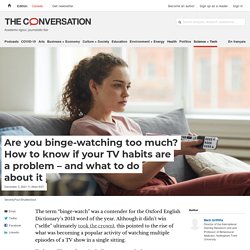
Although it didn’t win (“selfie” ultimately took the crown), this pointed to the rise of what was becoming a popular activity of watching multiple episodes of a TV show in a single sitting. Today, millions of us – including me – regularly consume our favourite series in this way. The proliferation of streaming services over recent years has made it very easy to do. Unsurprisingly, during COVID lockdowns, research shows many of us spent more time binge-watching than usual. But can binge-watching become problematic or addictive? Problematic binge-watching isn’t defined by the number of episodes watched (although most researchers agree it’s at least two in a row), or a specific number of hours spent in front of the TV or computer screen. Over many years studying addiction, I’ve argued that all addictive behaviours comprise six core components. A look at the evidence Breaking the habit.
Home. Sans titre. Truth or Fiction - Official Site. iReporter. NewsFeed Defenders. Bad News. Subscribe to Knowhere. Home : Hypothesis. Sans titre. Sans titre. Our students use the web every day -- shouldn't we expect them to do better at interpreting what they read there?
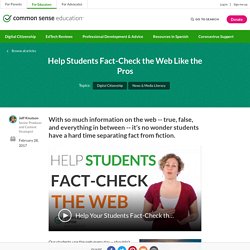
Perhaps … but not necessarily. Often, stereotypes about kids and technology can get in the way of what's at stake in today's complex media landscape. Sure, our students probably joined Snapchat faster than we could say "Face Swap," but that doesn't mean they're any better off at interpreting what they see in the news and on the web. As teachers, we've probably seen students use questionable sources in our own classrooms, and a recent study from the Stanford History Education Group confirms it: Students today are generally pretty bad at evaluating the news and other information they see online. Now more than ever, our students need our help. The web can also be our students' best tool in the fight against falsehood.
In a lot of ways, the web is a fountain of misinformation. FactCheck.org PolitiFact Snopes This popular online resource is all about internet rumors. OpenSecrets.org. Turn Students into Fact-Finding Web Detectives. Fact-Checking Tips and Tools for Teachers and Students Show students where to look for credible information on the web.
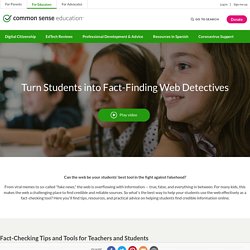
Explain that professional fact-checkers may already have done this important work for us. Use the resources below as references for finding vetted and fact-checked information. Google Search Skills Every Student Should Know Upgrade your students' Google game! Using Reverse Image Search as a Fact-Checking Tool Google is great for fact-checking -- but only if you know how to use it! Resources to Address the So-Called "Fake News" Phenomenon Make news literacy part of your web-literacy lessons. Further Reading and Research on Web and Media Literacy. Sans titre. Sans titre. The Skills Toolkit – Free digital courses to help you progress in work and boost your job prospects. What is INFORMATION LITERACY? What does INFORMATION LITERACY mean? INFORMATION LITERACY meaning.
How Teachers Can Navigate School Closures Due to the Coronavirus. Updated with new resources on 4/29/20.
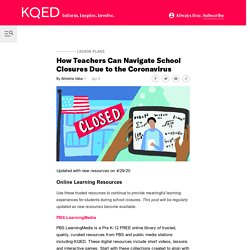
Online Learning Resources Use these trusted resources to continue to provide meaningful learning experiences for students during school closures. This post will be regularly updated as new resources become available. PBS LearningMedia PBS LearningMedia is a Pre K-12 FREE online library of trusted, quality, curated resources from PBS and public media stations including KQED. See digital resource and TV programming alignment by grade and subject... Get started with these digital resources with our free training videos.PBS LearningMedia, 15 minute webinar.
KQED Media Academy for Educators The new KQED Media Academy for Educators offers a set of four free, instructor-led online professional development courses that prepare educators to effectively and meaningfully analyze, evaluate and make media with students to support curriculum goals. KQED Learn Above the Noise Additional Supports Educational TV Programming on KQED Plus.
Three Tools for Teaching Critical Thinking and Problem Solving Skills. One of the tools Jason Watt learned about in his training is called the ladder of inference.
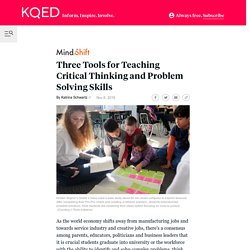
It’s a model for decision making behavior developed by Harvard professors Chris Argyris and Donald Schön. Essentially, it helps students slow down and realize which data they are taking into account when they make a decision and how the data they choose is informed by their past experiences. Assumptions are often made in a split second decision because the brain is wired to prioritize data that confirms the model a person already holds.
The ladder of inference is a way to check those assumptions. Watt first used the ladder in a very basic way; he showed his grade two students an image of a soccer player lying on the ground, one leg up, holding his head. “Students started to realize there was a lot more going on in the picture just in terms of data than what they first said,” Watt said. Watt asked his students to brainstorm ideas for the worst restaurant of all time. Sans titre.